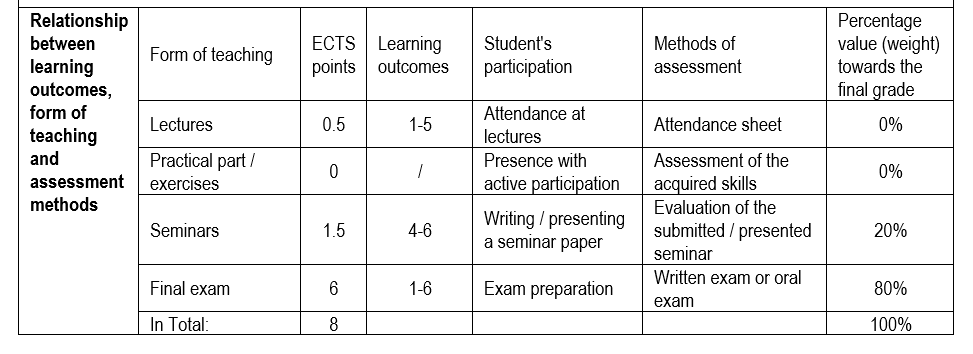Students acquire basic ethical principles of medicine, including modern deontological guidelines, they identify the importance of health for society and the main public health concepts and approaches, they understand development of medicine and changes in views regarding health and diseases over time as well as universal, international and interdisciplinary approaches to medicine, lastly they master the basics of information systems and information tools in the health care system.
Module 1 The first part of this module represents lectures on national and international declarations, conventions, laws and codes that should help students get an insight into medical and dental moral, material and criminal liability.
The second part of this module consists of 15 seminars that students will conduct in groups and where they will study chosen chapters from medical deontology in detail, also they will get familiar with some ethical dilemmas that doctors encounter in their work.
Module 2 Genesis and development of medical ethics; history, cause, problems of the origin, development and status of bioethics. Foundation of the doctor-patient-society relationship. Professional aspects of medical ethics, bioethics, deontology and medical law.
Challenges of medical ethics and bioethics in the context of biomedical progress. Applicability of traditional ethical principles. Ethics in organ transplantation. Ethics in psychiatry and coercive treatment. Ethics in human genetics. Ethics in human reproduction and human procreation. Ethics in reanimatology and intensive treatment. Ethics in paediatrics. Euthanasia and versions. Role and significance of national and international regulations in solving current questions in the field of medical ethics and bioethics. Function, status and structure of ethical committees.
Module 3 Development of medical science and practice through history - from prehistoric medicine to modern medicine. Accomplishments of Croatian doctors abroad and some foreign doctors in Croatia; development of organised medical societies, health care education and hospitals in Croatia. Encouraging students to think and motivate students through seminars and field trips.
Module 4 Data base. Electronic medical records. Information systems in the health care system. Signals in medicine. Images in medicine. Telemedicine and telematics. Support systems for medical decision making. Safety of information and cryptography. Nomenclatures and classification in medicine. Computer networks and the Internet as infrastructure of scientific informing.
Module 5 Teaching students about the relationship between economic laws and the health protection system. Gaining knowledge on planning process in health care and its importance. Gaining knowledge on organisation of health protection, basic elements of the health care system and its functioning. Gaining knowledge on basic elements of financing models of health protection and basic systems of financing health protection in modern countries. Getting familiar with characteristics of health insurance in the Republic of Croatia.
Required course materials:
Grmek MD, Budak A, ur. Uvod u medicinu. Globus, Zagreb, 1996.
Kovačić L, ur. Organizacija i upravljanje u zdravstvenoj zaštiti. Zagreb: Medicinska naklada, 2003.
Škrobonj A, Muzur A, Rotshild V. Povijest medicine za praktičare. Rijeka, Adamić, 2003. (izabrana poglavlja)
Upon completion of this course, students will be able to:
- determine basic medical terminology and professions;
- argue the role of the history of medicine in medical education and daily work of health professionals;
- evaluate the characteristics of certain historical periods in the development of medicine and medical practice from its beginnings to the present day;
- critically evaluate the characteristics of the development of dental medicine through different historical periods and their impact on the development of dentistry in Croatia
- review the concepts of ethics, morals, bioethics, ethical theories, principles and ethical approaches to certain topics;
- valorize the role of dentists in the health institution according to ethical principles.



